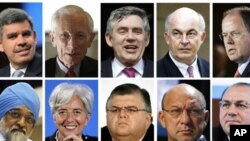Former International Monetary Fund (IMF) chief Dominique Strauss-Kahn of France has been released on bail from a New York jail cell, after being charged and then held for attempted rape. But only one day after his resignation, the debate over who should replace him has already begun.
Despite pleading innocence, the images of Dominique Strauss-Kahn in handcuffs was unbecoming of the leader of the global banking institution.
Guilty or not, many - including U.S. Treasury Secretary Tim Geithner say the damage has already been done. "Of course, I can't comment on the case, but he's obviously not in a position to run the IMF,” he said.
The race to find a successor is underway. But political analyst Daniel Gros says finding a leader that can satisfy all of the IMF's 187 member countries will not be easy.
"Everybody in the world will, of course, be competing now, but we have to realize that the emerging countries also have widely different interests. Think about China versus India versus Brazil. So it will be very difficult to find somebody who serves the political interests of any one group," said Gros.
Since its founding, the top job at the IMF has traditionally been filled by a European. But there is growing opposition to that arrangement. Beijing insists the IMF's future leader should reflect the growing clout of developing nations.
And the list of potential candidates is long: They include Zhu Min, deputy governor of the People's Bank of China; Agustin Carstens, Mexico's central bank governor; and South Africa's former finance chief, Trevor Manuel.
But Owen Barder at the Center for Global Development sees difficulty for non-European candidates. "It will be easier for Europe to come up with a single candidate who they want to nominate than it will be for the emerging markets to get an agreement. They don't necessarily have the mechanisms and the history of nominating a single candidate. So the danger is, that Europeans, because they're used to doing it, will find someone very quickly and try to push them forward as a fait accompli," said Barder.
Early European favorites include Axel Weber, the former president of Germany's Bundesbank and French Finance Minister Christine Lagarde. Right now, economist Jacob Kirkegaard says the frontrunner status belongs to Lagarde.
"Because one, she's a very skillful policymaker. She's got a lot of experience, both in Europe obviously, but also at the G20 level. And she has, for better or worse, the advantage - she would represent a new face to the IMF and international organizations because she would be the first woman to run such an organization," stated Kirkegaard.
Ultimately, all sides agree the choice must be based on merit.
"It could be a European, it could be someone from an emerging market or even an American -- the point again being that you should really focus on the fact that you need a credible, well respected, policy heavyweight," added Kirkegaard.
Together, the United States and European nations hold more than 50 percent of the voting power at the IMF. The U.S. has yet to take a position on who can best fill the vacuum left behind by Strauss-Kahn's stunning departure.




